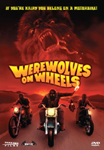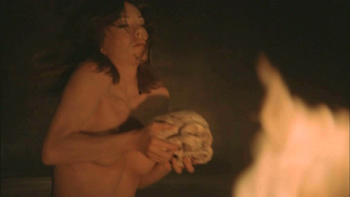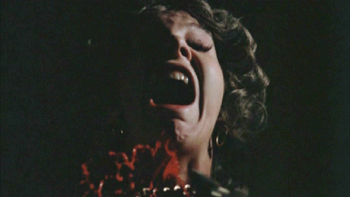
 BUY IT AT AMAZON: CLICK HERE!
BUY IT AT AMAZON: CLICK HERE!
STUDIO: Dark Sky Films
MSRP: $14.98
RATED: R
RUNNING TIME: 79 Minutes
SPECIAL FEATURES:
• Commentary w/ dir. Michel Levesque and writer David M. Kaufman
• Photo Gallery
• Radio Spots
• Theatrical Trailers
The Pitch
"This is an efficient production we’re running. The title is the pitch."
The Humans
Steven Oliver (
), Billy Gray (Father Knows Best), and DJ Anderson.
The Nutshell
One of Russ Meyer’s art designers follows a motorcycle gang along their rampage across the boring bits of
Despite Tarot’s warning — or maybe because of it; the plot isn’t entirely clear on this point — the gang invades the grounds of an order of cloistered Satanists. The Satanists either don’t take kindly to this or rejoice in it, depending on which individual shot you’re speaking of, and kidnap Helen to perform a topless snake-and-skull dance for them.
They also cast a spell, or something, and the bikers find themselves hunted through the desert by a wolf-like beast who, strangely, is never in the same place as a certain member of their own — kinda like

Poor Yorick’s missin’ out. That’ll teach him to be dead.
The Package
It’s exploitation cinema from the 70s, so the video and audio quality aren’t exactly what you’d call "good." Still, Dark Sky Films has done an admirable job with the cleanup, and though the picture quality is limited at the ability of the camera used to pick it up, the frames are clean and nicely color-balanced in 1.85:1 widescreen.
The audio is in 2.0 mono and sucks ass, but that’s the fault of the of the cheapo equipment of thirty-five years ago and the mumbling actors. Important dialogue comes through all right, but the rest of the track is muddled, occasionally distorted, and mixed at several wildly different levels throughout.
The bonuses are few in number, but quite a treat. In addition to a photo gallery and the standard theatrical trailers, we also get some radio spots. These are artifacts of neglected forms of marketing, and great fun to listen to, since they follow in the overly-dramatic tradition of radio-only shows of the forties and fifties.
There is also a full-length commentary by director Michel Levesque, writer David M. Kaufman, as well as David Gregory from Blue Underground, who plays the role of moderator. It’s a pretty prosaic track, contrary to the content of the film. There are stories about shoestring budget, script rewrites, musical choices — nothing surprising, but enough to hold your interest. As a caveat, on the two players I tried it on, the track had a really annoying distortion on the speech, a sort of warble that sounds as if it came from bad processing.

Pleasure or pain? Only the vicious wolfman knows the answer.
The Lowdown
Exploitation films, like Werewolves on Wheels, isn’t intended for a general audience. It’s the cinematic equivalent of the stage show at the Moulin Rouge: the target audience members are those who want to be titillated by exactly what they expect, and nothing more. Werewolves on Wheels upholds those standards beautifully. Run down the check-list and you find we’ve got tits, violence, some shots of decent gore, and a quest for revenge that’s more fun as a journey than a goal.
Coherency isn’t exactly the watch word of directors of exploitation, but it could have been a little closer to the tip of director Michel Levesque’s tongue. The setting changes occur abruptly and are only loosely stitched together; it’s the sort of thing that happens when there are neither time nor budget for reshoots. It isolates the sets to the point of distraction.
Half the setpieces are great, the other half are kind of tired. The Satanic ritual and the final fight in the desert are complete cheesy fun, but the rest don’t have the same sense of over-the-top fun. All the sequences lack the firm character direction that makes exploitation work, the impression that the protagonist has got a mission. This makes it so the audience isn’t upset when the goal is abandoned, but also cuts the individual sequences loose from the minimal amount of plot coherency.
Werewolves on Wheels would be a decent purchase for those, like me, who immediately crow at the masterful title; but even for that specific audience, Levesque didn’t quite fire on all cylinders.
5.8 out of 10